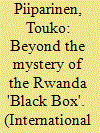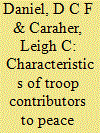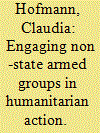| Srl | Item |
| 1 |
ID:
072895


|
|
|
|
|
| Publication |
2006.
|
| Summary/Abstract |
According to the conventional wisdom of the current debate on peacekeeping, the failures of the UN Security Council in general and in Rwanda in particular can be attributed to an absence, not of early warning systems, but of political will on the part of member states. This article argues against the assertion, advanced in much of the existing literature, that political will outweighed early warning in importance. These two factors were interlinked and cannot therefore be compared as if they existed separately. Instead, a more advanced early warning mechanism would have changed the political context so as to facilitate political will to intervene. At a minimal level, such a positive causal relationship would have enabled non-permanent Council members to acknowledge the genocide prior to UNAMIR's (United Nations Assistance Mission for Rwanda) withdrawal and thus to create a political atmosphere of urgency to rescue Rwandans instead of withdrawing troops.
|
|
|
|
|
|
|
|
|
|
|
|
|
|
|
|
| 2 |
ID:
072892


|
|
|
|
|
| Publication |
2006.
|
| Summary/Abstract |
This article addresses two basic questions: Do most of the countries that have participated in peace operations in 2001-04 exhibit particular characteristics? If so, what are the implications for increasing the number of sustained and substantial contributors in the near term? We compared contributors and non-contributors along three dimensions: size of active-duty ground forces, regional location, and societal characteristics (governance, per capita income, internal stability and level of development). Among the most significant of our seven findings is that democratic, rich and middle income, stable and highly and lesser developed states constitute the majority profile of the peace operations community. We conclude that existing contributors are a more promising source of new sustained and substantial contributors than are nominal and non-contributors.
|
|
|
|
|
|
|
|
|
|
|
|
|
|
|
|
| 3 |
ID:
072899


|
|
|
|
|
| Publication |
2006.
|
| Summary/Abstract |
Formal actors are faced with vast shortcomings in articulating a legal foundation for engaging non-state armed groups. This essay addresses the difficulties, differences and commonalities for state and non-state actors in engaging with non-state armed groups. It demonstrates how non-governmental organizations offer the potential to fill the gap in the international legal regime by employing lower-key initiatives that avoid political issues such as the legitimization or recognition of non-state armed groups. The essay concludes that 'small agreements' in the humanitarian field bear the capacity to contribute enormously to prospective peace processes.
|
|
|
|
|
|
|
|
|
|
|
|
|
|
|
|
| 4 |
ID:
072897


|
|
|
|
|
| Publication |
2006.
|
| Summary/Abstract |
This article examines the role of the United Nations Mission for the Referendum in Western Sahara (MINURSO) in promoting conflict resolution in this former Spanish colony occupied by Morocco since 1975. It argues that MINURSO was not able to provide space for transformative policies in the fields of human rights and democratization because the mission was constrained by power politics. It outlines the theoretical basis of peacekeeping and its linkage with a Focauldian approach to the production of power/knowledge. It then assesses the role of MINURSO in the promotion of conflict resolution and the extent to which the parties' disagreements in the identification of voters and UN bias hindered the process which was to lead to the organization of a self-determination referendum for the Western Saharan people. Finally it explores how the UN failure to promote conflict resolution in Western Sahara is related to a western approach to the settlement of disputes, which is more concerned with promoting stability by containing violence rather than with attempting to address the root causes of conflict.
|
|
|
|
|
|
|
|
|
|
|
|
|
|
|
|
| 5 |
ID:
072894


|
|
|
|
|
| Publication |
2006.
|
| Summary/Abstract |
This article places the Iraqi National Conference of August 2004 in a comparative context by examining the role of national conferences in transitional and post-conflict countries. It argues that national conferences do not contribute significantly to a transitional process, if a prior political agreement on the process and on the role of the Conference among key stakeholders is absent. In Iraq, the disagreement over the transitional framework created by the Coalition Provisional Authority and the US-appointed Iraqi Governing Council impeded a truly inclusive Conference from taking place. A core of established political parties, distrusted by the opposition, controlled the Conference preparations. A transparent preparatory process did not take place; the Conference did not serve as a forum for genuine dialogue. Finally, the National Council elected by the Conference did not expand political participation to credible opposition figures.
|
|
|
|
|
|
|
|
|
|
|
|
|
|
|
|
| 6 |
ID:
072898


|
|
|
|
|
| Publication |
2006.
|
| Summary/Abstract |
The Nordic peacekeeping model rose as a result of: selection criteria that limited the number of troop contributors to a select group of small and middle-sized states; common as well as national interests that made support for UN peacekeeping the logical policy; and the low-cost/high pay-off nature of the enterprise. Its fall in the 1990s was caused by the vast increase in the number of troop contributors, a strong reluctance to use force beyond self-defence and the growing involvement of the EU and NATO. A Nordic resurgence would have to be based on civilian contributions, but the will to establish such cooperation is unlikely to be mobilized in the near term.
|
|
|
|
|
|
|
|
|
|
|
|
|
|
|
|
| 7 |
ID:
072896


|
|
|
|
|
| Publication |
2006.
|
| Summary/Abstract |
In December 2004 the report of the High-level Panel on UN reform recommended that Security Council authorization for all regional peace operations should be mandatory, a detail that was omitted from the Secretary-General's follow-up report In Larger Freedom and from the agenda of the World Summit meeting in September 2005. Opposition to the proposal highlights anxieties about power imbalances in the UN. However, alongside reform of the Security Council, this initiative would enhance regional capacity to regulate the intervention of outside actors. Such a step would address one of the key issues undermining the authority of the UN Security Council.
|
|
|
|
|
|
|
|
|
|
|
|
|
|
|
|
| 8 |
ID:
072900


|
|
|
|
|
| Publication |
2006.
|
| Summary/Abstract |
This article examines the UN Force in Cyprus (UNFICYP) following the failed attempt to reunite the island in April 2004. It reviews the post-referendum reduction in the size of the Force and analyses the prospects for further major changes to the mission in the future. Specifically, it argues that while any further significant alterations would appear unlikely in the near term, given the current positions of the main parties in the Security Council, a radical rethinking of the UNFICYP may well be possible, if not necessary, in the light of Turkey's progress towards EU membership.
|
|
|
|
|
|
|
|
|
|
|
|
|
|
|
|